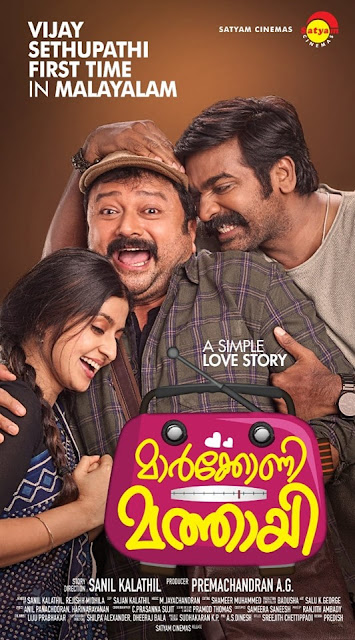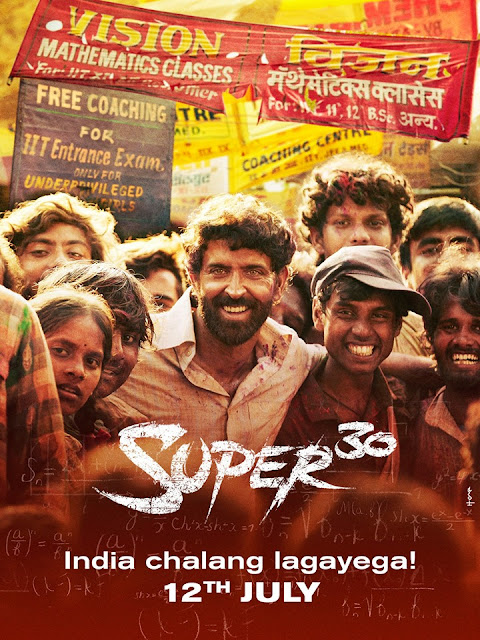|
Release
date:
|
July 12, 2019
|
|
Director:
|
Sanil Kalathil
|
|
Cast:
Language:
|
Jayaram, Athmiya,
Vijay Sethupathi, Mallika Sukumaran, Joy Mathew, Aju Varghese, Mammukoya
Malayalam with
Tamil and a bit of Hindi
|
It is a measure of
how confused, confusing and amateurish this film is that the makers
have failed to do something as basic as arrive at a single spelling for
the hero’s name. The closing credits list him as Mathaai, the subtitles refer
to him consistently as Mathayi or rather by his nickname Marconi Mathayi, and
the film’s IMDB page, which I assume is managed by them, goes with Marconi
Mathai. For the sake of order and my peace of mind, I am sticking with the
latter.
Jayaram here plays
a happy-go-lucky elderly bachelor called Mathai who is fond of the radio.
He earned the monicker Marconi Mathai when he got an oddly old-fashioned
tiny Kerala town hooked on the invention credited to Guglielmo Marconi. Mathai
is a former Armyman who now works as a security guard at a local bank. His
popularity does not shield him from the global obsession with marriage - the entire
town is determined to alter his marital status, with one old lady going so far
as to belittle him in public because of it.
Unmarried people
are used to being trivialised and pestered, their privacy constantly invaded
with even virtual strangers deeming it fit to ask why they have not hitched
themselves to another human being. There is a film worth making on how
Indian singletons deal with the pressure and peskiness. Marconi Mathai is the opposite of being that film. The
intrusiveness of Mathai’s community is cutesified and given the veneer of
comedy, and it is clear that we are expected to consider it a mark of their
affection that they are perennially on his case to get
himself a wife. They coax and scold and scheme and prod and bully and badger
and hound him so much and for such a large part of the running time that I
swear I got so exhausted at one point, I felt like yanking Mathai off the
screen, finding him a willing woman and forcing him to marry her, just so that
the darned film would get over.
Many yawns later, a
young spinster called Anna (Athmiya) joins the bank as a sweeper cum cook, and
Mathai’s friends decide she is an ideal match for him. That she looks young
enough to be his child does not deter them, and why would it? Since when has
age been a hurdle in romance for Malayalam cinema’s star Daddy brigade?
Weirder still is
Mathai’s reaction. There are spoilers coming up, but seriously this film is so
bad, do you really care about niceties? So as I said, Mathai, who has
persistently avoided marriage for decades because he was hurt in love as a
child, suddenly falls for Anna. Yeah yeah, Athmiya is a beauty, but considering
that there are millions of good-looking people in this world, and Anna is dull
to boot, it is a mystery that Mathai is willing to give up his life-long
commitment to bachelorhood for her.
The bigger mystery
of course is why Tamil cinema stalwart Vijay Sethupathi picked this vacuous,
pointless film for his Malayalam debut. Cineastes are still reeling under the
impact of his stupendous performance in Thiagarajan Kumararaja’s Super Deluxe earlier this year, and
Mollywood has so much quality to offer an actor of his calibre, so why on earth
did he opt for this empty vessel?
Sethupathi plays
himself, a major Kollywood star who lands in Kerala to promote his new Tamil
film for what seems like weeks or maybe even months via a call-in radio show.
It takes a particularly infertile imagination to come up with such an implausible,
ridiculous ruse to write Vijay Sethupathi into a screenplay. The role has
been positioned in the promotions as being substantial, but it is really
nothing more than a stretched-out cameo in which the actor is saddled with
terribly written dialogues in what amounts to an extended ad for Red FM.
You know of course
the two threads will intersect at some point, but never mind how the twain
meet. Just know that Mathai, when rejected by Anna, acts with less maturity
than a five year old and – get this – the entire village shames her for
breaking his heart, which causes her to promptly fall in love with him.
When the action
shifts to Goa (don’t ask why), Marconi
Mathai becomes even more slapdash, dull and purposeless than it was in
Kerala. Oh, the trauma!
Someone actually
wrote this script. A bunch of talented someones actually agreed to come on
board. And someone actually agreed to finance it.
It makes no sense
to analyse the acting because the greatest thespians in the world would
struggle to rise above a story and screenplay this bad. If there is a bright
spot on this very dismal landscape, it comes in the form of Sajan Kalathil’s
pretty aerial shots of the story’s water-bound location, and Sameera Saneesh’s
eye-catching outfits for Anna. And then there were those moments when I
allowed my exasperation at the limp narrative to recede into the background and
simply gaped at Vijay Sethupathi. Thus do hapless viewers stuck in a movie
hall find ways to extract the price of a ticket off the screen.
Director Sanil
Kalathil shares the blame in the credits for the abysmal writing. In the
tradition of many Malayalam filmmakers who seem to think Hindi is the ultimate
sign of coolth, he tosses a couple of Hindi lines into the background
score as Mathai cycles around the town square in a love-lorn daze, borrowing
heavily from the Bollywood classic, ‘Yeh
kya hua, kaise hua, kab hua’, though with a different tune: What is this
that has happened? How did it happen? When did it happen?
The reference of
course is to the feeling of lurrrrrvvve that is washing over Mathai’s being
during that scene, “pyaar” as one of
his Hindi-fixated buddies insists on calling it. The words of the song
unwittingly echo my thoughts about Marconi
Mathai: What is it? How did it happen? When? And why oh why?
Marconi Mathai has the air of being a film that thinks it is
addressing crucial existential questions. Let me assure you, Mr Kalathil, it is
not.
Rating (out
of five stars): 1/2
|
CBFC Rating (India):
|
U
|
This review has also been published on Firstpost:
Poster
courtesy:



